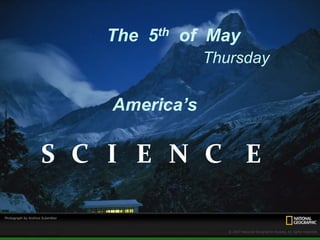
A republic of science for lesson
- 1. The 5th of May Thursday America’s S C I E N C E
- 2. Aim: Students will know about America’s science
- 3. Inquiry and innovation in science
- 4. The US came into being during the Age of Enlightenment (circa 1680 to 1800), a period in which writers and thinkers rejected the superstitions of the past. Enlightenment philosophers envisioned a “republic of science” where idea is would be exchanged freely and useful knowledge would improve the lot of all citizens. The US has encouraged science and invention. It has done this by promoting a free flow of idieas, encouraging the growth of “useful knowledge” and by welcoming creative people from all over the world. The US Constititution itself reflects the desire to encourage scientific creativity.
- 5. A good climate for science It was good place for science in America
- 6. Benjamin Franklin Two of America’s founding fathers were scientists of some repute. Benjamin Franklin proved what had been suspected but never before shown: that lightning is a form of electricity /1752/. He also invented such conveniences as bifocal eyeglasses /1760/ and a stove /1742/ that bears his name. The first bifocal eyeglasses
- 7. Benjamin Rush, by introducing new medical treatments, he made the Pennsylvania After the war David Hospital in Philadelphia an example of medical Rittenhouse designed road and canal Enlightenment and after his military service Rush established the first free clinic in the US. system for the state of Pennsylvania.
- 8. Alexander Graham Bell who arrived from Scotland by way of Canada in 1872, developed and patented the telephone invention. Charles Willson Peale is best remembered as an artist but he also was a natural historian, inventor, educator and politician. He created the first major museum in the US, the Peale Museum in Philadelphia.
- 9. American know-how During the 19th century Britain, France and Germany were at the forefront of new ideas in science and mathematics. But the United States lagged behind in the formulation of theory, it excelled in using theory to solve problems: applied science. Because Americans lived so far from the Western science and manufacturing, they often had to figure out their own ways of doing things. When Americans combined theoritical knowledge with “Yankee ingenuity” the result was a flow of important inventions. The great American inventors The first steam boat include Robert Fulton (the steam boat), Samuel F.B Morse (the telegrapgh), Eli Whitney (the cotton gin), Cyrus McCormick (the reaper) and Thomas Alva Edison. The most fertile of them all, with more than a thousand inventions credited to his name. The first cotton gin The first reaper
- 10. Americans have won approximately half of the Noble Prizes awarded in the sciences. The Wright brothers built and flew several gliders. Then on December 17, 1903 they successfully flew the first heavier-than-air mechanically propelled airplane The British engineer Joseph Swan built an incandescent electric lamp in 1860, almost 20 years before Edison. But Edison’s was better. Edison’s light bulbs lasted much longer than Swan’s and they First successful flight made could be turned on and off by Orville and Wilbur individually. Within 30 years, Wright Edison’s inventions had introduced electric lighting into millions of homes.
- 11. How has the United states encouraged science and invention? answer
- 12. Can you describe America’s good climate for science? answer Please fill the chart after reading scientists’ inventions. answer Who When What did
- 13. Can you describe American know-how? answer Why did the United States lag behind the science? answer
- 14. It was around 1680 to 1900
- 15. It has done this by supporting many creative idieas, encouraging the growth of “useful knowledge” and by welcoming creative people from all over the world. The US Constititution itself includes the policy to encourage scientific creativity.
- 16. It was good place for science. American science was closely linked with the needs of the people and it was free from European preconceptions.
- 17. Who When What did Alexander Graham Bell: 1876 The "Box" telephone in 1879, Pioneering long distance oral communication. Thomas Edison 1879 Electrical Light Thanks to his desire to "let there be light", we can work at night! Samuel Morse and 1844 Pioneering speedy Alfred Vail communication through the written word. The Morse Telegraph Key Charles Willson Peale The first major museum click
- 18. When Americans combined theoretical knowledge with “Yankee ingenuity” the result was many inventions
- 19. Because Americans lived so far from the Western science and manufacturing.
- 20. Conclusion America could encourage the inventions of science America was a good place to develop science America could combine theoretical knowledge with native Americans ingenuity
- 21. Thank you for the attention!
